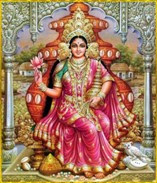From Nama 684 to 741 the glories of the Divine Mother are discussed.
The Divine Mother is girdled or encircled by the oceans.
Mekhala means an ornament that is worn around the waist as a belt. That covers the frontal region of the ladies. It is different from the Odiyanam which is a belt worn around the waist.
The Divine Mother is wearing the oceans as Her Mekhala. (Similar to chastity belt). When we say that She is having the entire universe world as her body, then having the oceans as an ornament around Her waist is appropriate. Considering the whole universe as the form of the Divine Mother has many benefits. Souls depending upon their maturity can visualize the outside world. For a fully matured soul, inside and outside visualizations are seen as the Divine Mother. To consider all things seen by the devotees, as the Divine Mother, helps to mature their souls. When the soul starts to realize that all things which are seen as forms of the Divine Mother are the best devotional approach in understanding this Nama.
When the Divine Mother is having all the fourteen worlds as Her form, the earth becomes Her waist. The oceans are encircling the earth, meaning that they act as an ornament encircling Her waist. The Divine Mother is having oceans like Her Mekhala The ocean can agitate, but the earth is calm or has all the patience. The Divine Mother grants patience and strength to those who consider earth as Her waist with all the patience.
The Divine Mother is Mother Earth, who is encircled by the oceans. The earth is worshipped as Mother, “rich in water, rich in fruits, cooled by the mountain winds and lush green with vegetables for the humans”, because She is an image of the Divine Mother. The respect given to a country as the Motherland comes from this concept of treating the earth as mother.
The Divine Mother’s waist is encircled
by oceans.
C N Nachiappan
Singapore, 19
December
2021.; updated 12 February
2025
References:
1.
The Thousand
Names of the Divine Mother published in English by Mata Amritanandamayi Center,
San Ramon, California, USA, with Commentary by T. V Narayana Menon
2.
Shri Lalitha
Sahasranama Stostram published in Tamil by N. Ramaswami Iyer charities’
societies, Trichirapalli, India, with Commentary by C. V. Radhakrishna Sastry.
3. The Lalitha Sahasranamam published in Tamil by Shri Ramakrishna Thapovanam, Thiruipparaithurai, Trichy District, Tamilnadu, India with commentary by Shrimath Swami Sithbavandar



No comments:
Post a Comment